外研版新标准五年级下册6~10模块重点知识
五下外研版英语知识点归纳

五下外研版英语知识点归纳第一单元:My New Teachers1. 人称代词的用法:I, you, he, she, it, we, they。
2. 动词be的用法:am, is, are。
3. 询问及回答姓名、年龄、班级等基本信息。
4. 询问及回答他人的姓名、年龄、班级等基本信息。
5. 询问及回答自己喜欢的科目和老师。
第二单元:At the Farm1. 名词所有格的用法:’s或s’。
2. 数词的读法及用法。
3. 表示“有”的句型:There is/are。
4. 自然界的事物的名称及特征。
5. 描述农场的事物的名称及特征。
第三单元:Where’s My Schoolbag?1. 表示位置的介词:in, on, under, behind。
2. 描述教室及物品的位置。
第四单元:What’s for Dinner?1. 表示物品的数量的基数词:one, two, three,等。
2. 表示物品的数量的序数词:first, second, third,等。
3. 描述食物的名称及口味。
4. 询问及回答想要吃的食物。
第五单元:Doing Housework1. 表示活动的动词:clean, sweep, make, do等。
2. 描述家庭活动及物品的用途。
3. 询问及回答自己平时做的家务活。
第六单元:Weather Report1. 表示天气的形容词:sunny, rainy, cloudy, windy等。
2. 描述不同季节的天气。
3. 询问及回答今天的天气情况。
第七单元:On April Fool’s Day1. 表示时间的基数词:one, two, three,等。
2. 表示时间的序数词:first, second, third,等。
3. 描述过去发生的事情。
4. 询问及回答自己在过去的某个时间所做的事情。
第八单元:Going to the Grand Canyon1. 表示地点的介词:in, on, under, behind。
外研版五年级下册英语重点内容总结

外研版五年级下册英语重点内容总结Unit 1: My World- Key vocabulary: school, classroom, desk, chair, board, book, pen, pencil, ruler, eraser- Key grammar: "This is my classroom." "I have a book."- Important phrases: "Hello, everyone." "Goodbye, teacher."Unit 2: My Clothes- Key vocabulary: T-shirt, dress, skirt, pants, shorts, shoes, socks, hat, coat- Key grammar: "I like my T-shirt." "I don't like pants."- Important phrases: "What are you wearing?" "I am wearing a skirt."Unit 3: My Family- Key vocabulary: father, mother, brother, sister, baby, grandfather, grandmother- Key grammar: "This is my family." "I have a brother."- Important phrases: "How many people are there in your family?" "I have a baby sister."Unit 4: My Toys- Important phrases: "What's your favorite toy?" "My favorite toy is a teddy bear."Unit 5: My Schoolbag- Key vocabulary: schoolbag, pencil case, notebook, textbook, crayon, colored pencil, calculator, sharpener- Key grammar: "I have a schoolbag." "I don't have a notebook."- Important phrases: "What's in your schoolbag?" "In my schoolbag, there is a textbook and a pencil case."Unit 6: My Body- Key vocabulary: head, eye, ear, nose, mouth, hand, arm, leg, foot - Key grammar: "I have two arms." "I don't have a big nose."- Important phrases: "How many eyes do you have?" "I have two eyes."Unit 7: My Face- Key vocabulary: face, hair, forehead, eyebrow, eyelash, cheek, nose, mouth, tooth- Key grammar: "I have a round face." "I don't have long hair."- Important phrases: "What color are your eyes?" "My eyes are brown."Unit 8: My Pets- Key vocabulary: dog, cat, fish, bird, rabbit, hamster, turtle, mouse - Key grammar: "I have a pet dog." "I don't have a pet bird."- Important phrases: "Do you have any pets?" "Yes, I have a cat."Unit 9: My Friends- Key vocabulary: friend, boy, girl, classmate, best friend, playmate, team, group- Key grammar: "He is my friend." "She is my best friend."- Important phrases: "Who is your best friend?" "My best friend is Lisa."Unit 10: My City- Key vocabulary: city, park, street, house, building, shop, zoo, museum- Key grammar: "I live in a city." "I don't live in a house."- Important phrases: "What places are there in your city?" "There is a park and a museum."Unit 11: My Day- Key vocabulary: morning, afternoon, evening, night, breakfast, lunch, dinner, homework- Key grammar: "I have breakfast in the morning." "I don't have dinner at night."- Important phrases: "What do you do in the evening?" "I do my homework."Unit 12: My Week- Key vocabulary: Monday, Tuesday, Wednesday, Thursday, Friday, Saturday, Sunday, weekend- Key grammar: "Today is Monday." "Tomorrow is Tuesday."- Important phrases: "What day is it today?" "It is Wednesday."Unit 13: My Birthday- Key vocabulary: cake, party, present, candle, balloon, hat, invitation, celebrate- Key grammar: "Today is my birthday." "I don't have a birthday cake."- Important phrases: "When is your birthday?" "My birthday is on May 3rd."。
外研版英语五年级下册Module 6知识点
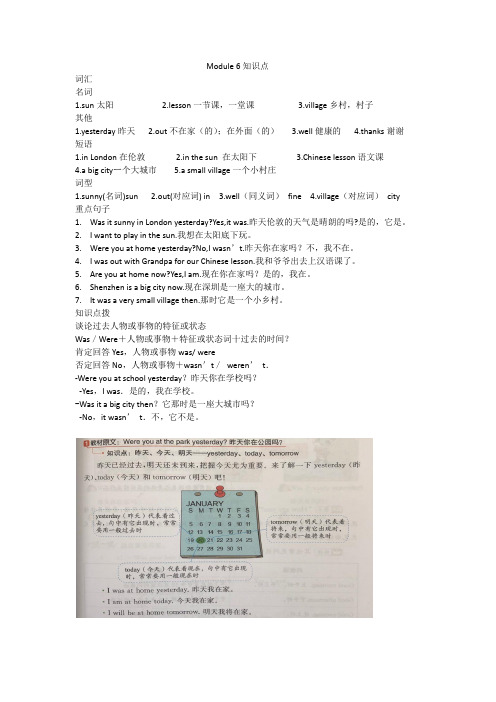
Module 6知识点词汇名词1.sun太阳2.lesson一节课,一堂课3.village乡村,村子其他1.yesterday昨天2.out不在家(的);在外面(的)3.well健康的4.thanks谢谢短语1.in London在伦敦2.in the sun 在太阳下3.Chinese lesson语文课4.a big cityー个大城市5.a small village一个小村庄词型1.sunny(名词)sun2.out(对应词) in3.well(同义词)fine4.village(对应词)city 重点句子1.Was it sunny in London yesterday?Yes,it was.昨天伦敦的天气是晴朗的吗?是的,它是。
2.I want to play in the sun.我想在太阳底下玩。
3.Were you at home yesterday?No,I wasn’t.昨天你在家吗?不,我不在。
4.I was out with Grandpa for our Chinese lesson.我和爷爷出去上汉语课了。
5.Are you at home now?Yes,I am.现在你在家吗?是的,我在。
6.Shenzhen is a big city now.现在深圳是一座大的城市。
7.It was a very small village then.那时它是一个小乡村。
知识点拨谈论过去人物或事物的特征或状态Was/Were+人物或事物+特征或状态词十过去的时间?肯定回答Yes,人物或事物was/ were否定回答No,人物或事物+wasn't/weren’t.-Were you at school yesterday?昨天你在学校吗?-Yes,I was.是的,我在学校。
-Was it a big city then?它那时是一座大城市吗?-No,it wasn’t.不,它不是。
外研版五年级下册英语学习重点整理

外研版五年级下册英语学习重点整理
本文档旨在整理《外研版五年级下册英语》的研究重点。
以下
是一些主要的研究内容:
1. 语法重点
- 过去时态:be动词(was, were)和动词过去式的构成。
- 现在进行时:be动词(am, is, are)和动词的现在分词形式的
构成。
- 一般将来时:will + 动词原形。
- there be句型:描述存在或发生的事情。
2. 词汇重点
- 动物:猫(cat)、狗(dog)、鸟(bird)、鱼(fish)等。
- 水果:苹果(apple)、橙子(orange)、香蕉(banana)等。
- 食物:米饭(rice)、面包(bread)、牛奶(milk)等。
- 颜色:红色(red)、蓝色(blue)、绿色(green)等。
- 数字:1(one)、2(two)、3(three)等。
3. 口语表达重点
- 问候语:Hello!、How are you?等。
- 日常用语:What's your name?、Where do you live?等。
4. 阅读理解重点
- 阅读短文和问题,选择正确的答案。
- 根据短文内容回答问题。
- 根据图片给出正确的答案。
以上是《外研版五年级下册英语》的学习重点整理,请同学们重点掌握,并合理安排学习时间。
通过积极学习,相信你们会取得好成绩!加油!。
新外研版(三起)英语五年级下册全册知识点归纳
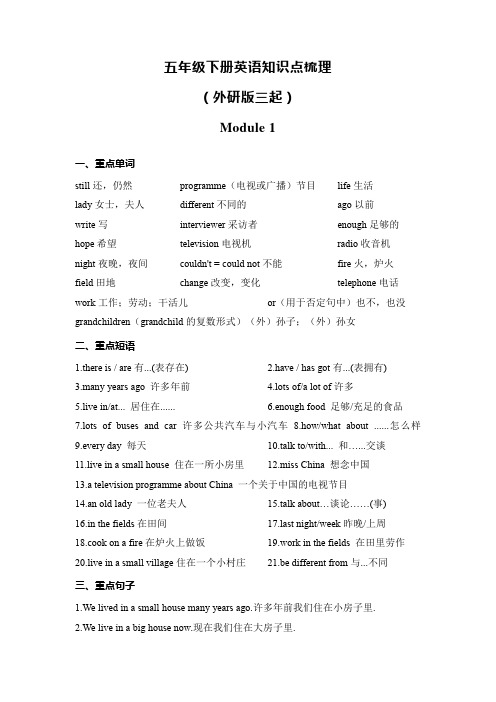
五年级下册英语知识点梳理(外研版三起)Module 1一、重点单词still还,仍然programme(电视或广播)节目life生活lady女士,夫人different不同的ago以前write写interviewer采访者enough足够的hope希望television电视机radio收音机night夜晚,夜间couldn't = could not不能fire火,炉火field田地change改变,变化telephone电话work工作;劳动;干活儿or(用于否定句中)也不,也没grandchildren(grandchild的复数形式)(外)孙子;(外)孙女二、重点短语1.there is / are有...(表存在)2.have / has got有...(表拥有)3.many years ago 许多年前4.lots of/a lot of许多5.live in/at... 居住在......6.enough food 足够/充足的食品7.lots of buses and car许多公共汽车与小汽车8.how/what about ......怎么样9.every day 每天10.talk to/with... 和…...交谈11.live in a small house 住在一所小房里12.miss China 想念中国13.a television programme about China 一个关于中国的电视节目14.an old lady 一位老夫人15.talk about…谈论……(事)16.in the fields在田间st night/week昨晚/上周18.cook on a fire在炉火上做饭19.work in the fields 在田里劳作20.live in a small village住在一个小村庄21.be different from与...不同三、重点句子1.We lived in a small house many years ago.许多年前我们住在小房子里.2.We live in a big house now.现在我们住在大房子里.3.There weren't many buses.过去没有这么多的公共汽车。
外研版五年级英语下册各单元知识点汇总
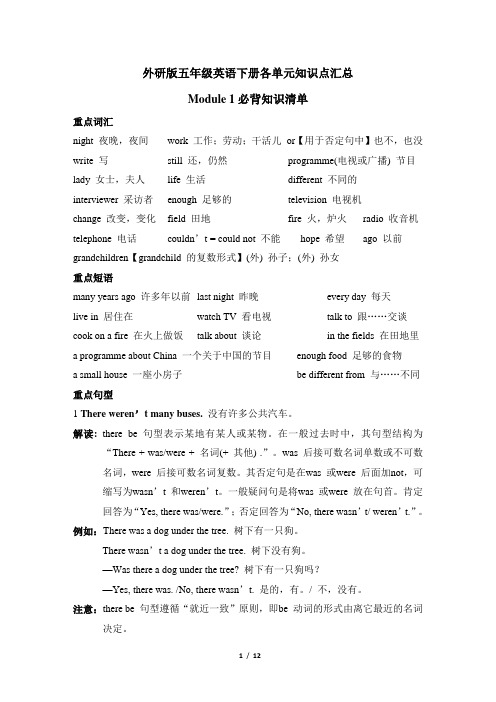
外研版五年级英语下册各单元知识点汇总Module 1必背知识清单重点词汇night 夜晚,夜间work 工作;劳动;干活儿or【用于否定句中】也不,也没write 写still 还,仍然programme(电视或广播) 节目lady 女士,夫人life 生活different 不同的interviewer 采访者enough 足够的television 电视机change 改变,变化field 田地fire 火,炉火radio 收音机telephone 电话couldn’t = could not 不能hope 希望ago 以前grandchildren【grandchild 的复数形式】(外) 孙子;(外) 孙女重点短语many years ago 许多年以前last night 昨晚every day 每天live in 居住在watch TV 看电视talk to 跟……交谈cook on a fire 在火上做饭talk about 谈论in the fields 在田地里a programme about China 一个关于中国的节目enough food 足够的食物a small house 一座小房子be different from 与……不同重点句型1 There weren’t many buses.没有许多公共汽车。
解读: there be 句型表示某地有某人或某物。
在一般过去时中,其句型结构为“There + was/were + 名词(+ 其他) .”。
was 后接可数名词单数或不可数名词,were 后接可数名词复数。
其否定句是在was 或were 后面加not,可缩写为wasn’t 和weren’t。
一般疑问句是将was 或were 放在句首。
肯定回答为“Yes, there was/were.”;否定回答为“No, there wasn’t/ weren’t.”。
五年级下册英语外研版三起第十模块重点语法
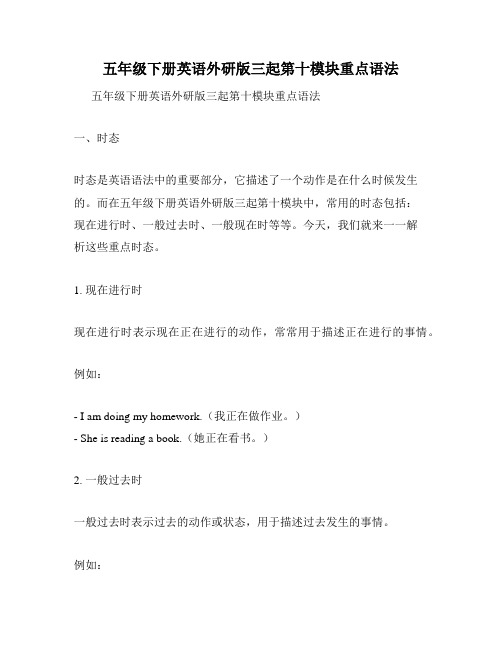
五年级下册英语外研版三起第十模块重点语法五年级下册英语外研版三起第十模块重点语法一、时态时态是英语语法中的重要部分,它描述了一个动作是在什么时候发生的。
而在五年级下册英语外研版三起第十模块中,常用的时态包括:现在进行时、一般过去时、一般现在时等等。
今天,我们就来一一解析这些重点时态。
1. 现在进行时现在进行时表示现在正在进行的动作,常常用于描述正在进行的事情。
例如:- I am doing my homework.(我正在做作业。
)- She is reading a book.(她正在看书。
)2. 一般过去时一般过去时表示过去的动作或状态,用于描述过去发生的事情。
例如:- I watched TV yesterday.(我昨天看电视了。
)- She played basketball with her friends last weekend.(她上个周末和朋友们打篮球了。
)3. 一般现在时一般现在时表示现在的状态或经常性的动作,用于描述经常性的事情。
例如:- I often eat breakfast at 7:00 a.m.(我经常在早上7点吃早饭。
)- My sister loves to dance.(我的妹妹喜欢跳舞。
)二、语法结构在五年级下册英语外研版三起第十模块中还有一些重点的语法结构,下面我们就来一一介绍。
1. 疑问句疑问句是一种提问的句子结构,常用疑问词来引导。
例如:- What is your name?(你叫什么名字?)- Where do you live?(你住在哪里?)2. 否定句否定句是表示否定意义的句子,常常使用否定副词或情态动词来构成。
例如:- He doesn't like swimming.(他不喜欢游泳。
)- I can't eat spicy food.(我不能吃辣的东西。
)3. 感叹句感叹句表示强烈的情感,常常使用感叹词来表达。
例如:- What a beautiful scenery!(多么美丽的风景啊!)- How amazing he is!(他太厉害了!)三、从句从句是英语语法中的重要部分,它可以作为句子中的一部分来构成复杂句。
外研版英语五年级下册1到10模块重点知识复习
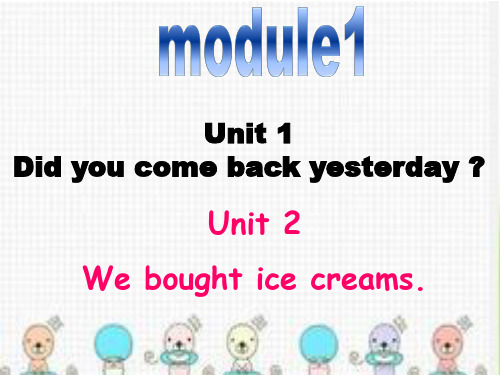
How much milk did you buy? also, We, of, chocolate, lot, a , bought.
We also bought a lot of chocolate.
Module 3
Unit 1
Where did you go?
Unit 2 Daming took a photo of his fahter
Is it your bag? 肯:Yes, it is. 否:No, it isn’t do did can is 否:don’t didn’t can’t isn’t
1.Did you have apple in this morning?
--No,I didn’t.I pears A.eat B.had
Mum bought a
for me
Mum bought a pair of me
如:Can you run fast? let’s go and fly it.
Pair work.
walk to school go home by bus watch TV
走路去学校 坐车回家 看电视
Did you
eat ice cream
do homework run finish the rice
A.buy
B.to
C.by
连词成句。
buy, many, you, did, apples, How ?
How many apples did you buy? bought, a, We, half, kilo.
We bought half a kilo.
连词成句。
milk, How much, you , did, buy?
外研版五年级下册英语模块十知识点

外研版五年级下册英语模块十知识点Module 10重点能够询问某人在某处放了什么能够询问某人将要去哪里能够介绍自己的旅行计划用一般过去时描述过去旅行的经历一、语音知识wh——[h]——who,whosewh——[w]——when,what,wherewr——[r]——write,wrong二、词汇when在什么时候end结束,终止nervous紧张的,情绪不安的all right没事,没问题airport机场ticket票passport护照safe安全的,平安的pet宠物speak说,讲building建筑物American美国的;美国人的;美国人find out发现,弄清more更多的(量),较多的(量)三、短语be ready for为......做好准备feel nervous感觉很紧张make a list列一张清单try American food尝尝美国食物all right没事,没问题tall buildings高大的建筑物at the airport在机场四、句子1.That’s a good idea.那是一个好主意。
2.Safe trip!(祝你)旅途安全!3.I think so.我认为是这样。
4.I’m in New York now.我现在在纽约。
5.—Where are you going?你要去哪?—I’m going to the airport.我要去机场。
6.—When are you going to the airport?你什么时候去机场?—At seven o’clock tomorrow morning.明早七点。
7.—What are you going to take?你打算带点什么?—Clothes,shoes,presents,the ticket and my passport.衣服,鞋子,礼物,机票还有护照。
五、句型结构①询问对方将要去哪里—Where are you going+其他?—I’m going to+地点.eg:—Where are you going tomorrow?你明天要去哪?—I’m going to the zoo.我要去动物园。
(完整版)外研版小学英语五年级的下册知识点梳理.doc
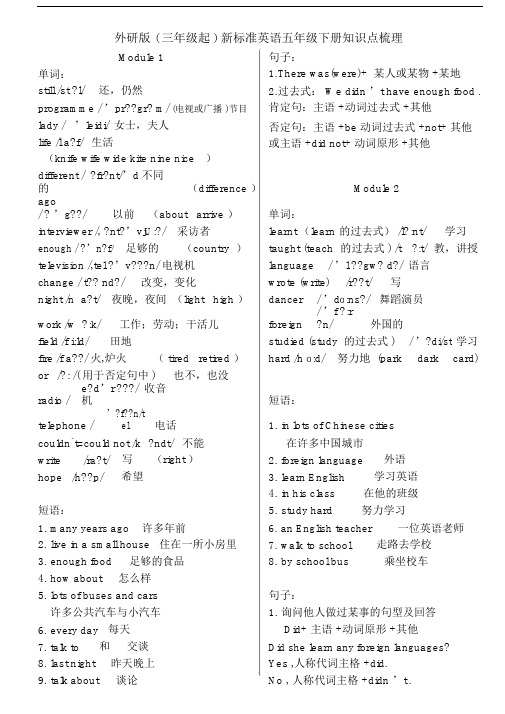
外研版 ( 三年级起 ) 新标准英语五年级下册知识点梳理Module 1单词:still /st ?l/还,仍然programme / ’pr??gr? m/ (电视或广播)节目lady /’leidi/女士,夫人life /l a?f/生活(knife wife wide kite nine nice)句子:1.There was(were)+ 某人或某物 +某地2.过去式: We didn ’t have enough food . 肯定句:主语 +动词过去式 +其他否定句:主语 +be 动词过去式 +not+ 其他或主语 +did not+ 动词原形 +其他different / ?fr?nt/’d不同的(difference )Module 2ago/ ? ’g??/ 以前(about arrive )单词:interviewer /, ?nt?’vjU:?/ 采访者learnt (learn 的过去式) /l?:nt/ 学习enough / ?’n?f/ 足够的(country )taught (teach 的过去式 ) /t ?:t/ 教,讲授television /,tel ?’v???n/ 电视机language / ’l??gw? d?/ 语言change / t?? nd?/ 改变,变化wrote (write) /r??t/ 写night /n a?t/ 夜晚,夜间(light high )dancer / ’dɑ:ns?/ 舞蹈演员work /w ?:k/ 工作;劳动;干活儿foreign / ’f?:r?n/ 外国的field /f i:ld/ 田地studied (study 的过去式 ) / ’?di/st 学习fire /f a??/ 火,炉火( tired retired )hard /h ɑ:d/ 努力地 (park dark card) or /?: /( 用于否定句中 ) 也不,也没radio / e?d’r???/ 收音机短语:telephone / ’?f??n/tel 电话 1. in lots of Chinese citiescouldn`t=could not /k ?ndt/ 不能在许多中国城市write /ra?t/ 写(right ) 2. foreign language 外语hope /h??p/ 希望 3. learn English 学习英语4. in his class 在他的班级短语: 5. study hard 努力学习1. many years ago 许多年前 6. an English teacher 一位英语老师2. live in a small house 住在一所小房里7. walk to school 走路去学校3. enough food 足够的食品8. by school bus 乘坐校车4. how about 怎么样5. lots of buses and cars 句子:许多公共汽车与小汽车 1. 询问他人做过某事的句型及回答6. every day 每天Did+ 主语 +动词原形 +其他7. talk to 和交谈Did she learn any foreign languages?8. last night 昨天晚上Yes ,人称代词主格 +did.9. talk about 谈论No , 人称代词主格 +didn ’t.10. cook on a fire 在炉火上做饭 2. 描述他人做过某事:11. work in the fields 在田地里劳作主语 +动词过去式 +其他She learnt English.What are you going to eat/drink ?3.描述他们现在在做某事:主语 +be+ 动词 ing+ 其他 Heis learning English now .Module 3单词:hamburger / ’h?mb?g?/ 汉堡English / ’??gl??/ 英国(式)的breakfast / ’brekf?st/ 早餐,早饭lunch /l ?nt ?/ 午餐,午饭sandwich / ’s?ndw ?t?/ 三明治fish and chips/f ?? t??ps/ 炸鱼加炸薯条traditional /tr ?’d???n l/ 传统的dish /d ??/食品;菜肴gave (give 的过去式) /ge?v/ 给tonight /t?’na?t/ 今夜,今晚短语:1.very much 很,非常2.an e-mail from Lingling一封来自玲玲的电子邮件4. about English food关于英国食物5.have an English breakfast吃了一顿英式早餐6.have for lunch 吃作为午餐7.a traditional English dinner一顿传统的英式晚餐8.giveto把给9. at school在学校句子:1.描述吃过某些食物:主语 + had +食物名称+ 其他2.询问他人打算吃/喝什么:3.询问他人三餐吃了什么:What + did + 主语+have+for breakfast / lunch / dinner ?Module 4单词:library/ ’l a?br ?ri/图书馆student / ’U:d?nt/stj学生sent(send 的过去式 ) /sent/发送,寄idea /a?’d??/ 主意,想法put /put/放,安放heavy / ’hevi/重的,沉的dictionary / ’d?k??n?ri/ 词典 ;字典card /k ɑ:d/ 卡片 ask /ɑ:sk/邀请 wrong /r??/ 错误的dear /d??/ 哎呀information /, ?nf?’me???n/信息project / ’?d?ekt/pr项目guide /ga?d/介绍,指南,手册film /f ?lm/电影way /w e?/方法,方式on 关于短语:1. library card图书卡,借书证2. on Shelf C在C架上3. as well /? s wel/又,还,也句型:1.询问某物在何处及回答的句型:Where are the about ,please ?Where can you find out about?You can find out in / on2Module 5 stay /ste?/ 停留( play day say )单词:July /d??’la?/ 七月light /la?t/ 轻的south /s a?θ/南,南部,南方;向南方hard /hɑ:d/ 困难的,费力的remember /r?’memb?/ 记得department store /d ?’pɑ:tm ?ntst ?:/ June / d? U:n/ 六月百货商店east / i:st/ 东,东部,东方;向东方pocket / ’p?k?t/ 口袋,兜best /best/ 最好的umbrella / ?m’brel?/ 雨伞north /n ?: θ/北,北部,北方;向北方sales assistant /se?lz?’ ?t?nt/ rest /rest/ 休息售货员,营业员rode (ride 的过去式) /r??d/ 骑wheel /wi:l/ 轮子easy / i:zi/ 容易的,不费力的短语:take /te?k/ 选择要,选择购买 1. have a rest 休息一下too /tU:/ 太,过于 2. of course 当然try /tr a?/ 试,尝试 3. in the west of China 在中国的西部lovely / ?li/’l 4. go there 去那儿美丽的,可爱的;令人愉快的5. last year 去年短语: 6. stay with和呆在一起1. at the department store 在百货商店7. in July 在七月2. buy you a new one 给你买一个新的8. every year 每年3. be easy for you 对你来说很容易9. Li people 黎族人4. be too for对来说太10. ride a horse 骑马5.taketo 把带到句型:句型: 1.用方位词表达地点:1. 描述事物特征的句型:It ’s in the north / south / east / west of It ’s get (big 反义 small ,heavy 反义 light ,easy 反义 hard )Module 72. 表达看法:单词:It ’s 形+容词 + for + 人称代词宾格evening / ‘?vn??/ 傍晚,晚上late /l e?t/Module 6 近日暮的;近深夜的;时间不早的单词:worker / ’w?:k?/ 工人moon /m U:n/ 月亮,月球factory / ’f?kt?ri/ 制造厂;工厂get /get/ 到达early / ’?:li/ 早的west /west/ 西,西部,西方;向西方taxi / ’t?ks ?/ 出租车,计程车parent /pe?r?nt/ 母亲;父亲;家长quarter / ’kw?:t?/ 一刻钟3to (距整点)差 ......worry/ ’w?ri/焦虑,担心短语:1. go to work上班2. be home在家句型:1.My father goes to work at eighto’clock every morning.2.What does he do?He ’sa policeman/worker.3.What does she do?She ’sa taxi driver.4.Will you be home at seven o’clock? Yes, I will. I ’llbe home at seveno ’clock.5.What time will you be home?I’llbe home at seveno ’clock.6.英语时间的表达法:1)整点:8:00 —— eight o’clock2)分钟小于或等于 30,就用 past 来表示,结构:分钟 + past + 该点钟12:05 —— five past twelve9:30 —— half past nine3)分钟大于 30,就用 to 来表示,结构:分钟 + to + 下一点钟8:40 —— twenty to nine4)分钟是 15,一般用 a quarter 来代替fifteen 。
外研版五年级下Module 10知识点归纳
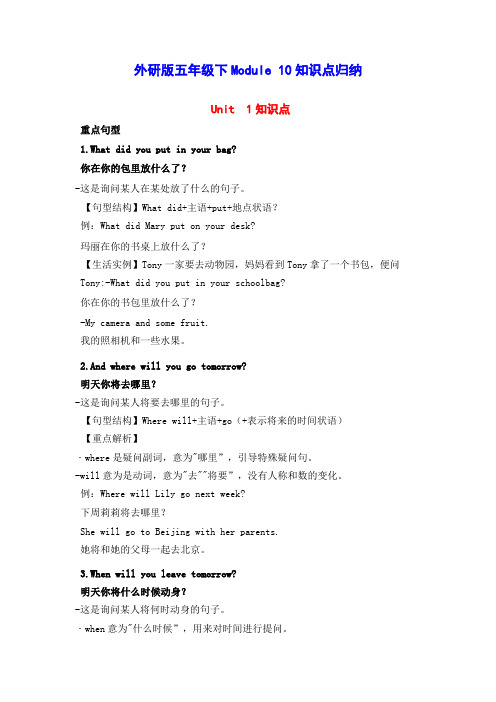
外研版五年级下Module 10知识点归纳Unit 1知识点重点句型1.What did you put in your bag?你在你的包里放什么了?-这是询问某人在某处放了什么的句子。
【句型结构】What did+主语+put+地点状语?例:What did Mary put on your desk?玛丽在你的书桌上放什么了?【生活实例】Tony一家要去动物园,妈妈看到Tony拿了一个书包,便问Tony:-What did you put in your schoolbag?你在你的书包里放什么了?-My camera and some fruit.我的照相机和一些水果。
2.And where will you go tomorrow?明天你将去哪里?-这是询问某人将要去哪里的句子。
【句型结构】Where will+主语+go(+表示将来的时间状语)【重点解析】・where是疑问副词,意为"哪里”,引导特殊疑问句。
-will意为是动词,意为"去""将要”,没有人称和数的变化。
例:Where will Lily go next week?下周莉莉将去哪里?She will go to Beijing with her parents.她将和她的父母一起去北京。
3.When will you leave tomorrow?明天你将什么时候动身?-这是询问某人将何时动身的句子。
・when意为"什么时候”,用来对时间进行提问。
【句型结构】When will+主语+leave(+其他)?例:When will Tom leave for America?汤姆将什么时候动身去美国?【生活实例】暑假要到了,Lucy打算来中国,她的好朋友Liu Mei问她:-When will you leave?你将什么时候动身?-Next Monday."下个星期一。
最新外研版新标准-五年级下册-6-10模块重点知识
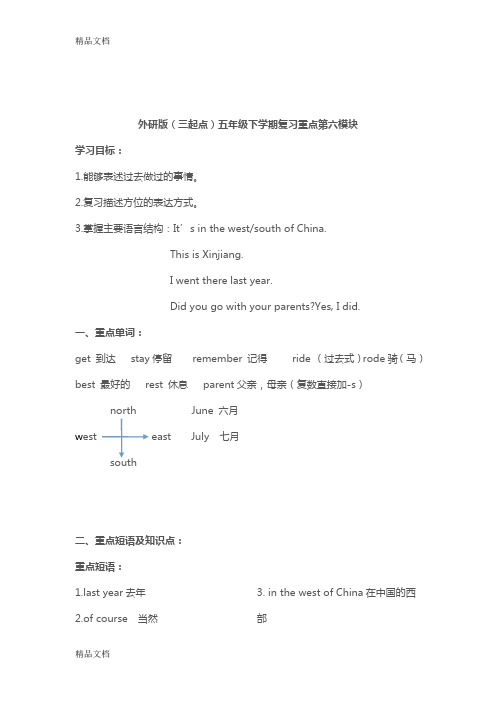
外研版(三起点)五年级下学期复习重点第六模块学习目标:1.能够表述过去做过的事情。
2.复习描述方位的表达方式。
3.掌握主要语言结构:It’s in the west/south of China.This is Xinjiang.I went there last year.Did you go with your parents?Yes, I did.一、重点单词:get 到达stay停留remember 记得ride (过去式)rode骑(马)best 最好的rest 休息parent父亲,母亲(复数直接加-s)north June 六月w est east July 七月south二、重点短语及知识点:重点短语:st year去年2.of course 当然3. in the west of China在中国的西部4. in July在七月(月份前面用介词in)5. every year每年6. stay with 和…待在一起7. ride a horse骑马8. go swimming去游泳9. live there 住在那里10. go with 和…一起去11. have a rest 休息一下12. climb the mountain 爬山13.have a lovely time 玩得愉快14. Li people 黎族人词形转换:1.go(过去式)went2. do(过去式)did3. stay(过去式)stayed4. ride(过去式)rode5. have(过去式)had6. photo(复数)photos7. live(第三人称单数)lives e(过去式)used9. they(宾格形式)them10. live(第三人称单数)lives11. stay(过去式)stayed12. real(副词)really13. parent(复数) parents14. you(形容词性物主代词)your重点句子:1. How did you get there? 你们是怎么到的那里?2. They are photos of me and my family in China. 他们是我和我的家人在中国的照片。
外研版五年级下册英语重点知识总结
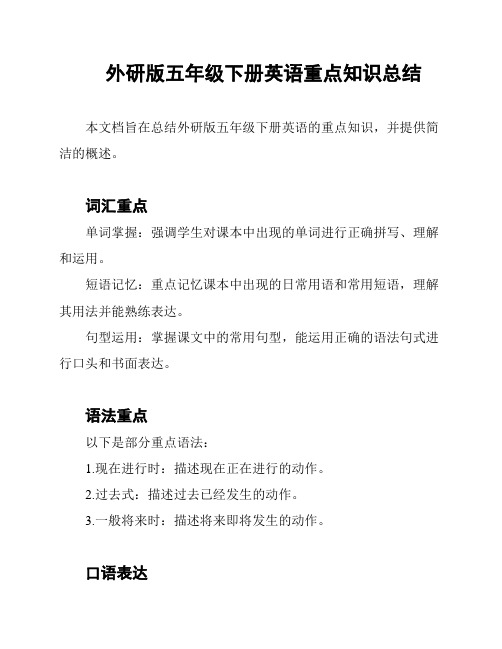
外研版五年级下册英语重点知识总结
本文档旨在总结外研版五年级下册英语的重点知识,并提供简洁的概述。
词汇重点
单词掌握:强调学生对课本中出现的单词进行正确拼写、理解和运用。
短语记忆:重点记忆课本中出现的日常用语和常用短语,理解其用法并能熟练表达。
句型运用:掌握课文中的常用句型,能运用正确的语法句式进行口头和书面表达。
语法重点
以下是部分重点语法:
1.现在进行时:描述现在正在进行的动作。
2.过去式:描述过去已经发生的动作。
3.一般将来时:描述将来即将发生的动作。
口语表达
鼓励学生进行口语练,重点培养以下能力:
1.日常交流能力:能够运用所学词汇和句型进行简单的日常对话。
2.情景表达能力:能够用英语描述自己的生活、研究、家庭等情景。
3.提问回答能力:能够提出问题并用英语做出回答。
阅读能力
培养学生的阅读能力和理解能力,重点培养:
1.快速阅读理解:能够快速理解短文的主题和大意。
2.细节理解:能够理解短文中的细节信息。
3.推理判断:能够通过阅读短文判断事实与观点。
写作能力
培养学生的写作能力,重点包括:
1.书写规范:要求学生在写作过程中注意拼写、标点等方面的规范性。
2.内容创新:鼓励学生在写作时进行个人想象创造,提高写作的趣味性。
3.表达准确性:要求学生在写作中准确表达自己的意思,避免歧义和错误用词。
以上是对外研版五年级下册英语的重点知识总结,希望能帮助学生全面复习和提高英语能力。
202X年小学英语外研版五年级下册模块知识点
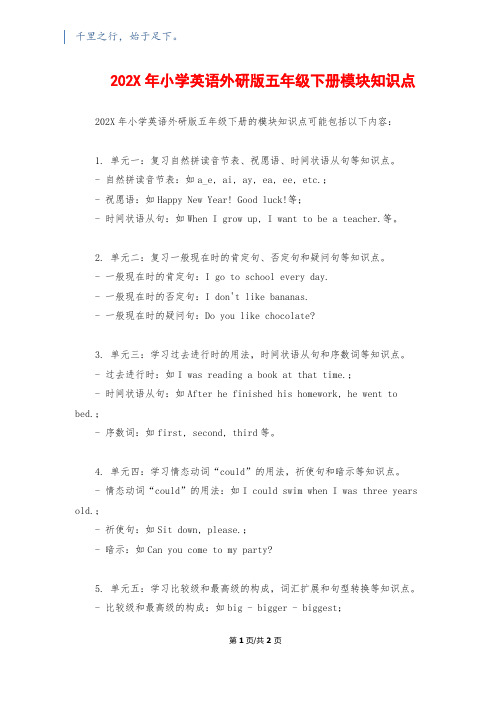
千里之行,始于足下。
202X年小学英语外研版五年级下册模块知识点202X年小学英语外研版五年级下册的模块知识点可能包括以下内容:1. 单元一:复习自然拼读音节表、祝愿语、时间状语从句等知识点。
- 自然拼读音节表:如a_e, ai, ay, ea, ee, etc.;- 祝愿语:如Happy New Year! Good luck!等;- 时间状语从句:如When I grow up, I want to be a teacher.等。
2. 单元二:复习一般现在时的肯定句、否定句和疑问句等知识点。
- 一般现在时的肯定句:I go to school every day.- 一般现在时的否定句:I don't like bananas.- 一般现在时的疑问句:Do you like chocolate?3. 单元三:学习过去进行时的用法,时间状语从句和序数词等知识点。
- 过去进行时:如I was reading a book at that time.;- 时间状语从句:如After he finished his homework, he went to bed.;- 序数词:如first, second, third等。
4. 单元四:学习情态动词“could”的用法,祈使句和暗示等知识点。
- 情态动词“could”的用法:如I could swim when I was three years old.;- 祈使句:如Sit down, please.;- 暗示:如Can you come to my party?5. 单元五:学习比较级和最高级的构成,词汇扩展和句型转换等知识点。
- 比较级和最高级的构成:如big - bigger - biggest;第1页/共2页锲而不舍,金石可镂。
- 词汇扩展:如long - longer - longest等;- 句型转换:如She is taller than her sister. - Her sister is shorter than her.以上只是可能的知识点范围,具体以教材内容为准。
2023年外研版一起五年级下册知识点总结

外研版(一起)第十册英语复习要点整顿第一模块词汇:1、drive(过去式drove)驾驶2、flute笛子 3、player演奏者4、office办公室5、factory(复数)factories6、shop商店7、hospital医院8、fish 打鱼,钓鱼(动词)9、farm农场职业名称拓展:1、farmer农民2、postman邮递员3、doctor医生4、nurse 护士5、firefighter / fireman消防员6、writer作家7、driver司机8、policeman警察短语:1、inthepicture在照片上2、drive a bus驾驶公共汽车3、Chinese music中式音乐4、playthe flute吹笛子5、teach English教英语6、work inan office在办公室工作7、work in a factory在工厂工作 8、work in ashop在商店工作9、work in a hospital在医院工作10.work on a farm 在农场工作11. aflute /anerhu player 一位笛子(二胡)演奏者语法要点:本模块我们重要学习用一般目前时形式和一般过去时形式谈论某人旳职业和详细工作。
要关注时间状语before/now,辨别时态。
问询职业及职业中旳细分类时要用特殊疑问词What .例:What didyourfather do ?What does yourfatherdo ?问询工作场所要用特殊疑问词Where例句: Where did yourfather work?Where does your father work ?重要句型:She was a driver before.此前她是个司机。
What didshedo before?Whatdidshe drive?She drove a bus. 她驾驶什么车?她驾驶公交车。
外研版五年级英语下册Module 10 单元知识梳理
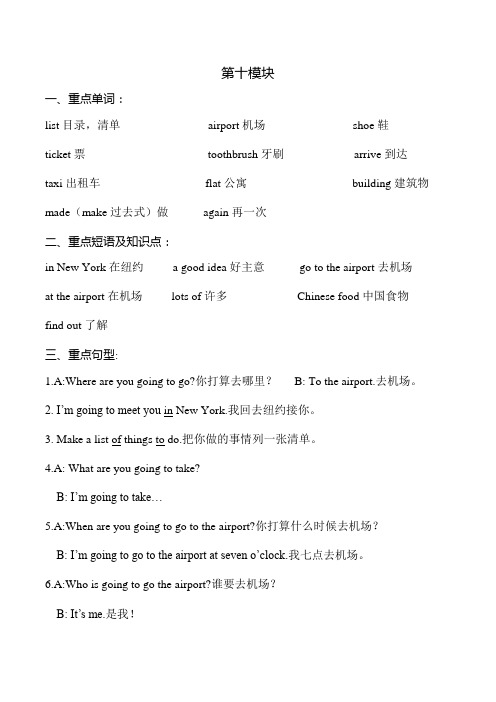
第十模块一、重点单词:list目录,清单airport机场shoe鞋ticket票toothbrush牙刷arrive到达taxi出租车flat公寓building建筑物made(make过去式)做again再一次二、重点短语及知识点:in New York在纽约 a good idea好主意go to the airport去机场at the airport在机场lots of许多Chinese food中国食物find out了解三、重点句型:1.A:Where are you going to go?你打算去哪里?B: To the airport.去机场。
2. I’m going to meet you in New York.我回去纽约接你。
3. Make a list of things to do.把你做的事情列一张清单。
4.A: What are you going to take?B: I’m going to take…5.A:When are you going to go to the airport?你打算什么时候去机场?B: I’m going to go to the airport at seven o’clock.我七点去机场。
6.A:Who is going to go the airport?谁要去机场?B: It’s me.是我!7. We went in a yellow taxi to their flat.我们坐一辆黄色的出租车去了他们的公寓。
8.There are lots of tall buildings and lots of cars and people.有许多高楼大厦,车水马龙。
9. Grandma made Chinese food for you.奶奶给你做了中国食物。
10. But I want to try American food.但是我想试试美国食物。
外研社(三年级起)英语五年级下册第6单元重点知识点汇总
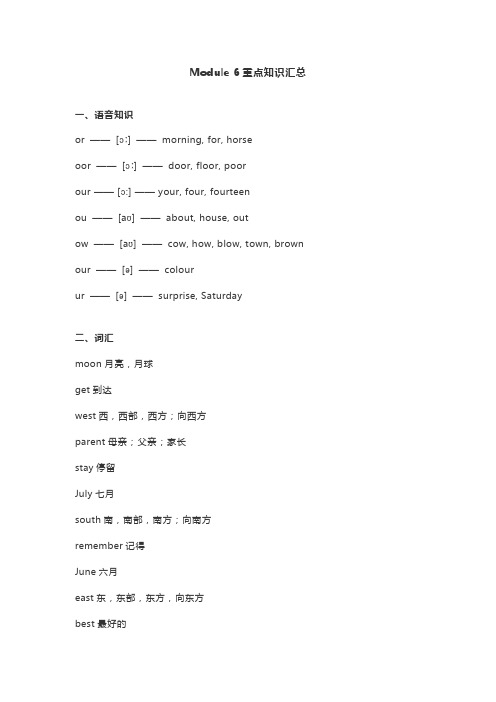
Module 6重点知识汇总一、语音知识or ——[ɔː] ——morning, for, horseoor ——[ɔː] ——door, floor, poorour —— [ɔ:] —— your, four, fourteenou ——[aʊ] ——about, house, outow ——[aʊ] ——cow, how, blow, town, brown our ——[ə] ——colourur ——[ə] ——surprise, Saturday二、词汇moon月亮,月球get到达west西,西部,西方;向西方parent母亲;父亲;家长stay停留July七月south南,南部,南方;向南方remember记得June六月east东,东部,东方,向东方best最好的north北,北部,北方;向北方rest休息have a rest休息一下rode(ride的过去式)骑三、短语get there到达那里every year每年ride a horse骑马have a lovely time玩得很开心some interesting photos一些有趣的照片in the west / south of China在中国的西/南部四、句子1. — Where did you go for the holidays? 你假期去了哪儿?—I went to the moon. 我去了月球。
2. Lingling has got some interesting photos. 玲玲有一些有趣的照片。
3. Xinjiang is in the west of China. 新疆在中国的西部。
4. Hainan is in the south of China. 海南在中国的南部。
5. — Did you go with your parents?你和你父母一起去的吗?—Yes, I did. 是的。
外研版(三起点)五年级英语下册各模块复习重点

外研版〔三起点〕五年级下学期复习重点第一模块一、重点单词:life生活different不同的ago以前any任何,一些television电视机field田地us我们〔宾格〕grandchildren〔外〕子〔女〕radio收音机fire炉火grandmother〔外〕祖母lady女士,夫人telephone hope希望二、重点短语与知识点:in China在中国many years ago许多年前enough food充足的食物lots of许多watch TV看电视have got有,拥有every day每天four years ago四年前a television programme一个电视节目last night昨晚talk about讨论on a(the) fire在火上in the fields在地里 a small(big) house一栋小〔大〕房子过去式:is——was are——were live——lived否认形式:were——weren’t did——didn’t现在分词:change——changing e——ing复数形式:bus——buses三、重点句型:1.We lived in a small house.我们住在一间小房子里。
2.It’s a programme about China.它是一个关于中国的节目。
3. Life was very different in China many years ago.许多年前中国的生活完全不同。
4. There are lots of buses and cars.有许多公交车和小汽车。
5.We live in a big house.我们住在一间大房子里。
6.Yesterday I watched TV with my grandchildren.昨天我和子们一起看电视了。
7. Thank you for talking to us.您和我们谈话。
- 1、下载文档前请自行甄别文档内容的完整性,平台不提供额外的编辑、内容补充、找答案等附加服务。
- 2、"仅部分预览"的文档,不可在线预览部分如存在完整性等问题,可反馈申请退款(可完整预览的文档不适用该条件!)。
- 3、如文档侵犯您的权益,请联系客服反馈,我们会尽快为您处理(人工客服工作时间:9:00-18:30)。
外研版(三起点)五年级下学期复习重点第六模块学习目标:1.能够表述过去做过的事情。
2.复习描述方位的表达方式。
3.掌握主要语言结构:It’s in the west/south of China.This is Xinjiang.I went there last year.Did you go with your parents?Yes, I did.一、重点单词:get 到达stay停留remember 记得ride (过去式)rode骑(马)best 最好的rest 休息parent父亲,母亲(复数直接加-s)north June 六月w est east July 七月south二、重点短语及知识点:重点短语:st year去年2.of course 当然3. in the west of China在中国的西部4. in July在七月(月份前面用介词in)5. every year每年6. stay with 和…待在一起7. ride a horse骑马8. go swimming去游泳9. live there 住在那里10. go with 和…一起去11. have a rest 休息一下12. climb the mountain 爬山13.have a lovely time 玩得愉快14. Li people 黎族人词形转换:1.go(过去式)went2. do(过去式)did3. stay(过去式)stayed4. ride(过去式)rode5. have(过去式)had6. photo(复数)photos7. live(第三人称单数)lives e(过去式)used9. they(宾格形式)them10. live(第三人称单数)lives11. stay(过去式)stayed12. real(副词)really13. parent(复数) parents14. you(形容词性物主代词)your重点句子:1. How did you get there? 你们是怎么到的那里?2. They are photos of me and my family in China. 他们是我和我的家人在中国的照片。
3. It’s in the west of China.它在中国的西部。
4. We stayed with my grandma for a week in July.七月我们和奶奶呆了一个星期。
5. He lives there with his tree children.他和他的三个孩子住在那里。
6. This is Xinjiang. I went there last year. 这是新疆。
我们是去年去的那里。
7. A: Did you go with your parents?你和你爸妈一起去的吗?B: Yes,I did.\No,I didn’t.是,是的。
\不,没有。
8. A:Where did you go for your holidays?你假期去哪里了?B:I went to the moon. 我去了月球。
9. Lingling has got some interesting photos. 玲玲有一些有趣的照片。
10. The mountains are really beautiful.这些山实在是太漂亮了。
11. Last July Lingling went to Xinjiang with her parents.去年七月玲玲和她的父母一起去了新疆。
12.She visited the Tianchi Lake. 她参观了天池。
13. A: Where did you go for your holidays?你假期去哪里了?B: I went to Yinchuan.我去了银川。
14.A: Where is Yinchuan?银川在哪?B: It’s in the north of China. 它在中国的北部。
三、基本句型:1. 询问对方是否和某人一起去的句型及答语。
——Did you go with +人?你是和…一起去的吗?——Yes, I did. 是的。
/ No, I didn’t. 不,不是。
例句:——Did you go with your parents? 你是和你父母一起去的吗?——Yes, I did. 是的。
2.描述某地所处方位的句型:省/城市/It + is + in the + 方向+ of + 地点“在…范围内的…部”例句:1. Guangzhou is in the south of China. 广州在中国的南部。
2. It is in the west of China. 它在中国的西部。
检测题:用所给单词的适当形式填空1.——________ (do) you go with your parents?——Yes, I did.2.——How did you _______ (get) there?——By bus.3.The __________ (mountain) are really beautiful.4.I ________ (go) there last year.5.Can I see _________(see) them?第七模块学习目标:1.掌握与职业相关的词汇和短语。
2.复习描述时间的词汇。
3.掌握主要语言结构:My father goes to work at eight o’clock every morning.He’s a policeman.I’ll be home at seven o’clock.一、重点单词:evening 傍晚,晚上late 近深夜的,时间不早的worker 工人factory 工厂early 早的taxi 出租车worry 焦虑,担心quarter 一刻钟to (距整点)差…二、重点短语及知识点:重点短语:1. at half past seven 在七点半2. go to work 去上班3. a taxi driver 一位出租车司机4. take sb. to school 带某人去上学5. be late 迟到6. a quarter to eight 七点四十五7. get up 起床8. at seven o’clock 在七点钟9. go to school 去上学10. go home 回家be home 在家11. go to bed 上床睡觉12. every morning/evening 每天早上/晚上词形转换:te(对应词)early2.start(第三人称单数)starts3.child(复数) children4.I’ll (完整形式) I will5.morning(同类词)evening6.work(职业名词)worker7.get(第三人称单数)gets8.know(同音词)no9.it’s(完整形式) it is10.here(对应词)there重点句子:1. My father goes to work at eight o’clock every morning. 我爸爸每天早上八点钟去上班。
2.What does he do? 他是干什么的?3.A:What time will you be home? 你几点回家?B: I’ll be home at seven o’clock. 我将在七点钟回家。
4.Will you take us to the park tomorrow morning? 你明天早上要带我们去公园吗?5.Don’t worry! 别担心!6.It’s a quarter to seven. 六点四十五了。
(差十五分钟就七点了。
)三、基本句型:1.描述某人每天几点去工作的句型:人+go/goes to work + at +具体钟点+ every morning/evening/night. …在每天早上/晚上什么时间去工作。
例句:My father goes to work at eight o’clock every morning. 我爸爸每天早上八点钟去上班。
2.询问某人职业的句型及答语:——What do/does +主语+ do? …是做什么的呢?——主语+ be动词+ a/an 职业名词. …是…例句:——What does your mother do? 你妈妈是做什么的?——She is a nurse. 她是个护士。
3.询问某人几点将做某事的句型及答语。
——What time + will + 主语+ 动词原形+ 其他?…将在几点…?——主语+ will + 动词原形+ 其他+ at + 具体点钟. …将在…。
例句:——What time will your mother go home? 你妈妈将在几点回家?——She will go home at seven o’clock. 她将在七点钟回家。
检测题:按要求改写下册句子1.I’ll be home at seven o’clock.(改为一般疑问句)________ ________ be home at seven o’clock?2.Will he be home at seven o’clock?________, he _________.3.Do you get up at seven o’clock every morning? (做肯定回答)___________________________________4.She gets up at seven o’clock.(对划线部分提问)_______________________________________5.at it I every seven do o’clock morning (.)_______________________________________________第八模块学习目标:1.学会寻求帮助表达方式。
2.复习动词的过去式。
3.掌握主要语言结构:I’ll make a kite!Will you help me?What will you do tomorrow?一、重点单词:Chinese 中国人(的)word 词,字draw(过去式)drew cut(过去式)cut paper 纸piece 张,片,块paint 绘画,着色stick 小木棍,小木条tie(过去式)tied so 如此,这样二、重点短语及知识点:重点短语:1. what about = how about …怎么样2. make a kite 制作风筝3. thank you for …为…而感谢你4. a piece of paper 一张纸5. go swimming 去游泳6. cut the paper 剪纸7. draw a dragon 画一条龙8. in the sky 在天空中9. so high 如此的高10. a paper kite 一只纸风筝11. a great present 一份很棒的礼物12. have/has got 有13. a good/great idea 一个好主意14. put …on …把…放在…上词形转换:1.I(宾格)me2.drew(原形)draw3.cut(过去式)cut4.made(原形)make5.sister(对应词)brother6.paint(过去式)painted7.can(过去式)could9.tie(过去式)tied8.he’s got(完整形式)he has got重点句子:1. I’ll make a kite! 我将做一个风筝!2. Will you help me? 你会帮我吗?3. Thank you for your help. 谢谢你的帮助。
